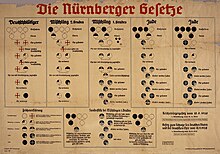
Back Justiz im NS-Staat German Droit nazi French Hukum di Jerman Nazi ID Direitos humanos na Alemanha Nazista Portuguese

From 1933 to 1945, the Nazi regime ruled Germany and, at times, controlled almost all of Europe. During this time, Nazi Germany shifted from the post-World War I society which characterized the Weimar Republic and introduced an ideology of "biological racism" into the country's legal and justicial systems.[1] The shift from the traditional legal system (the "normative state") to the Nazis' ideological mission (the "prerogative state")[1] enabled all of the subsequent acts of the Hitler regime (including its atrocities) to be performed legally. For this to succeed, the normative judicial system needed to be reworked; judges, lawyers and other civil servants acclimatized themselves to the new Nazi laws and personnel. As of 2021, a few laws from the Nazi era still remain codified in German law.[2][3][4][5]
- ^ a b E., Steinweis, Alan (2013). Law in Nazi Germany, The : Ideology, Opportunism, and the Perversion of Justice. Rachlin, Robert D. New York: Berghahn Books. ISBN 9780857457813. OCLC 861080571.
{{cite book}}: CS1 maint: multiple names: authors list (link) - ^ "Germany moves to eradicate lingering Nazi laws". France 24. 2021-01-22. Retrieved 2023-08-01.
- ^ FOULKES, Mathieu. "Germany moves to eradicate lingering Nazi laws, some anti-Semitic". www.timesofisrael.com. Retrieved 2023-08-01.
- ^ https://economictimes.indiatimes.com/
- ^ "After 75 years, Germany is moving to rid itself of cluster of laws introduced by Nazis - Nazi laws". The Economic Times. Retrieved 2023-08-01.
© MMXXIII Rich X Search. We shall prevail. All rights reserved. Rich X Search